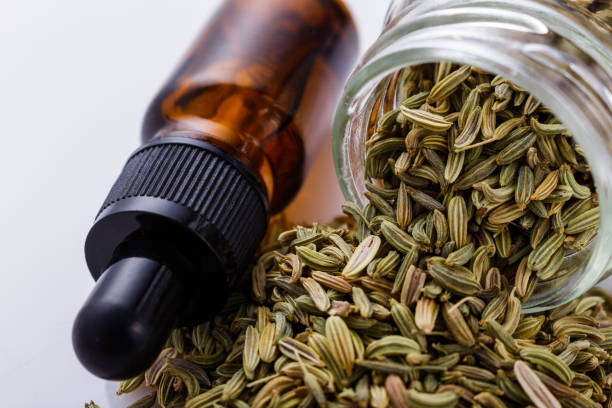
Also known as anise but not to be mistaken with Star anise, The licorice-like smell of aniseed essential oil Can be a bit divisive.
Aniseed, despite its erratic scent, has been used for thousands of years in a variety of ancient societies. It is even mentioned in the Bible.
Aniseed oil has many benefits that are not well known, especially for women going through menopause. Get the latest insights and updates from industry experts delivered straight to your inbox.
What is Aniseed essential oil?
Aniseed essential oil is distilled from the seeds. The anise, a native Egyptian plant, is often compared with fennel. It is also called star anise because of its distinctive licorice smell and name, but it is actually closer to Parsley Celery, a close relative.
Use aniseed essential oils to lift your mood
Aniseed has been shown to be an effective mood enhancer in extreme cases of low emotions.
Analysis of the antidepressant effects of ethanolic and aqueous extracts of Pimpinella anisum fruits in mice
The oil was found to have a powerful boosting effect on the animals. Further research in 2016 TRUSTED resource PubMed Central.
Anise Oil Effectiveness for Mild to Moderate Depressive Disorders in Patients with Irritable Bowel Syndrome
Humans also experienced a similar reaction. Aniseed significantly reduced mild to moderate symptoms of low mood, improving the subjects’ state of mind.
Low moods can have a negative impact on many things, from our productivity to our relationships. Diffusing Aniseed can help lift your mood and bring you happiness.
Does aniseed oil have antibacterial and antifungal properties?
Anise fruit fluid extract and essential oils have antifungal activity
Aniseed oil was found to be effective in fighting fungus and yeast. Research has shown that it may also be effective at treating dermatophytes, a type of fungus that can cause skin diseases.
Aniseed has also been shown to have significant antibacterial properties.
Anethole inhibits the growth of newly emerged multi-drug resistant toxigenic Vibrio. Cholera variant strains in vitro
Click here to go to the source. Aniseed’s active ingredient, anethole, is so effective at inhibiting bacterial growth that it was able to block a strain that causes cholera successfully. Aniseed oil has been credited with wound healing abilities. This is due to its antiseptic and antibiotic properties. The oil can be used to treat small cuts, scrapes, or bruises.
Is aniseed essential oils anti-inflammatory?
Aniseed oil can be used to treat sore muscles, inflammation, and other conditions that are caused by injury or infection.
The following are some of the ways to get in touch with each other.
Analgesic, anti-inflammatory, and analgesic activity of Pimpinella anisum fixed ole extract.
Aniseed oil has analgesic properties comparable to those of aspirin or other pain relievers. You can also find out more about the A-Team here.
Review of Pharmacological properties and chemical constituents of Pimpinella annum
Go to Source Aniseed oil contains a high amount of antioxidants. Antioxidants have many benefits for the body, including preventing oxidative stress and inhibiting free radical activity.
Antioxidants are also beneficial for reducing inflammation and protecting against some serious conditions.
Can Aniseed reduce the symptoms of menopause?
As a result, menopause can lead to a variety of unpleasant symptoms for older women.
Aniseed mimics the effects of estrogen, which can reduce common menopause symptoms such as hot flashes and dry skin.
Study on Effects of Pimpinella Anissum on Menopausal Hot Flashes Relief and Recurrence.
Click here to go to the source. Aniseed oil can reduce hot flashes by 75% in intensity and frequency. Aniseed oil diffused in the air can help manage menopausal discomfort.
Use Aniseed Essential Oil
Diffusing Aniseed around your house can have a positive impact on your mental well-being, even if you don’t like the licorice scent.
Aniseed’s supposed soothing properties can reduce stress, lift low moods, and encourage a more positive environment. This will improve sleep and relaxation and increase levels of positivity.
Aromatherapy can be replaced by adding a few drops of aniseed oil to your bath.
The oil’s scent will calm your mind and soothe any sore muscles, joints, or tendons that are caused by inflammation.
An anti-inflammatory massage is another way to use aniseed oil.
Skincare
The antibacterial and antifungal properties of aniseed oil make it a great facial cleanser. It helps to remove bacteria from pores, as well as to prevent infection.
You can use this oil to clean small wounds and abrasions. However, avoid applying it to open wounds.
Cleaning
Aniseed oil can be used to clean surfaces and keep them healthy. Its ability to kill bacteria is what makes it so effective.
Spray on surfaces to protect them or use them as part of a regular cleaning routine.
Making soap and candles
Aniseed essential oils can be a prominent top note for perfumery. They are a great addition to soaps or candles when you want a fragrance with a bit more body.
Aniseed Essential Oil: History
Aniseed, which ancient Egyptians used for both medicine and as a spice in cooking, was thought to have therapeutic properties.
Many ancient Greeks and Romans praised it as a mood booster.
Anise was so valuable in the 15th Century that it was used to scent clothes and as currency.





